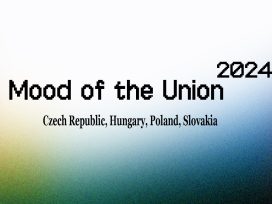I’ve often wondered what would happen were Hungary to slip off the face of the Earth from one day to the next. Would anyone care? Who’d mourn, who’d rejoice? What would the world stand to lose or gain from such an odd cataclysm?
In Brueghel’s famous painting, The Fall of Icarus, Icarus has fallen from high above and only his feet are popping out of the sea. Yet no one on the shore notices. Blithely, fishermen continue to fish, the shepherd drives his flock, the farmer ploughs his land. Many would take note of Hungary’s fall, but what would they think?
Poland might feel gutted for an instant, shedding a few tears in memory of the supposed ancient Polish-Hungarian friendship. Russia would build a big gas storage facility in Austria and swiftly rename their recent airline acquisition Malév. France? Their politicians, at a stretch, might feel a speck of dust roll off their chest, if only for the injustice of Trianon. Some intellectuals would no doubt talk about Fifty-Six for a while. Winemakers would label their wines “Tokay” again, and Sarkozy would no longer have to feel uncomfortable when questioned about his ancestors.
Germany would open a museum of remembrance to their fellow countrymen who had migrated to Hungary only to be kicked out after 1945. They’d publish a complete series of Márai’s works; Helmut Kohl et al would fondly remember József Antall, Hungary’s first freely-elected prime minister after her return to democracy; and Herder, who had already presaged the disappearance of the Hungarian nation – or at least its language – in 1791, would turn in his grave with great relish.
England could rest easy: any complacent smirking at 6:3 would be a thing of the past. The Spaniards could declare Öcsi Puskás, who played for the Real Madrid for 33 years, the son of their own nation once and for all. The CIA, World Bank and IMF, peremptorily assessing the situation, would conclude that from geo-political, security, economic and financial standpoints the black whole in Eastern Europe was of no importance whatsoever and close their files. Many would remember Kossuth, still more Zsazsa Gabor, Leo Szilard or Ede Teller, though most of them wouldn’t know from which sunken country they had wriggled. Brussels, with some relief, would acknowledge the quiet and civilised demise of that awkward and problematic country and would calculate how much money they would save as a result.
But enough of these silly examples! I only listed them to startle us into the realisation: today’s Hungary should put itself on the world map. Opportunities abound, but it seems that after some great expectations the country is living the years of an adolescent democracy and its citizens quarrel, fret, dither and complain incessantly instead of acting.
There’s no shortage of small countries which have seized opportunity by the scruff of the neck. If, say, the Netherlands were wiped away by the rising sea, shipping would be paralysed for a good while, banking and insurance would be disrupted, Shell stations would shut down and few chrysanthemums would be available to place on graves. Should Finland sink into the snow, there’d be a serious shortage on the mobile handset market, and the most ostentatious evidence of how a society can succeed if it takes education seriously would disappear with it. Austria, its mountains, murmuring rivers and baroque cities – an ever-idyllic, harmonious lifestyle would vanish along with its sparkling capital, one of the radiant centres of European culture.
A recent survey by pollster Medián put this sort of bizarre question to Hungarians. Optimism was not entirely absent: a mere tenth of respondents said Hungary’s disappearance would go unnoticed. But almost a fifth said nobody would care, and a similar proportion was adamant that the world stood to lose nothing were Hungary to go up in smoke. This indicates a serious self-identity problem: these Hungarians are sure that their country has nothing to show to the world.
Hungarians are known to vacillate between overestimating themselves (a glorious history, state-forming nation, the country of Nobel-prize winners and Olympic champions…) and bitterly excoriating themselves (isolated, no successes, perpetual losers, just look at the Austrians!). Instead of struggling between these two extremes, Hungary would be well advised to get a grip and indulge in some cool, sober self-reflection. It should get over its bitterness over the past – history was no “bloodier” in Hungary than in most European countries. A small or medium-sized country can produce great things. But great things are not about flag-waving or forced collectivism but reside in the national consciousness, in social consciousness and the dignity of a community which realises its self-worth.
It is an extremely difficult task – though not impossible – to rebuild a society’s broken and confused self-awareness. We’d only need think of the slow but consistent reshaping of German society’s mentality and behaviour in the Sixties-Seventies-Eighties, or a much quicker (and far from being exclusively economic) renaissance of the Irish and Finnish in the Eighties and Nineties.
Hungarians gave rather gloomy answers to the question of how they see their country ten years from now. Some 53 percent of survey respondents said the country “will be famous for its sports results”, and a mere fifth believed it would boast with “economic achievements”. It is a sad sign – as is often the case with poor and helpless countries – when they show off their shiny medals and try to hide the miseries of society behind their glory.
Hungary will be a backward, poor country ten years from now. This is how nearly half of those polled see the future. Only a third is hopeful that it will rise up and become a successful European country. This sounds dire. An awful lot of people, it seems, don’t believe in themselves or in the future of their country. It’s as if they placed their odds on the losing side before they’ve even entered the race.
Hungary’s political elite, its intellectuals and its media bear enormous responsibility for this negativity. For the last 17 years, politicians have been unable to formulate a comprehensive and attractive image of the future – the image of a prospering and successful Hungary. They have failed to work out steps for the recovery from hardship and make it into the ranks of successful European countries. With their hot-headedness, internal spats, bad decisions, moral shortcomings, they have created, for the vast majority of people, the impression that they are not in control of the situation, that they are unable to deliver the envisaged reforms. Neither did intellectuals do their jobs well; they still don’t. Helping people understand what has happened to them and to the country in the past decade and a half, what the real problems are and where opportunities lie, is their job. The media is finally making cautious forays into the thorny business of identifying problems. But it still has its work cut out to find and disseminate solutions, animate communities and foster autonomous, responsible citizens.
I’m sceptical about the view of those polled who think Hungary will be “the bridgehead to Russia” or “the European bridgehead of China” ten years from now. Hungary has had bridgehead dreams before: in the Eighties it wanted to be the European bridgehead for Toyota cars (that didn’t happen), and in the early Nineties it wanted to become a Western bridgehead in south-eastern Europe (it missed that not-so-grand opportunity). The desire to repaint the bridgehead is not a problem in itself – it was indeed one of the sources of Ireland’s success that it became America’s bridgehead in Europe – but it is not an end in itself. Norway, Sweden, Finland, the Netherlands, Spain are bridgeheads in themselves, by producing values which can make them an important part of the global economy in their own right.
As regards the commiserations over the imaginary loss of their country, it seems that Hungarian respondents have kept a vivid memory of the post-World War I anti-Hungarian alliance, the Little Entente (Serbo-Croat-Slovene Kingdom, Czechoslovakia, Romania). And this is very unfortunate, as feelings of being trapped in a spiral of animosity from neighbours can only lead to a slow and difficult adoption of the spirit of European cooperation among countries in the Central and Eastern European region, despite the fact that most of those countries are members of the European Union. But the current situation cannot be blamed solely on neighbouring countries: Hungarians have not done enough in this field in the past decade and a half.
The survey included a question about how people might feel about a federal alliance between the states of Hungary and Austria within the next ten years. Only 20 percent believed this was conceivable. I do not know if that relatively low response rate was fuelled by wise political considerations and a sense of reality or a lack of imagination: people simply cannot imagine that in the upcoming years and decades such unexpected, really big realignments could happen in the European Union and in the world in general.
It is interesting to note, however, that nearly twice as many people thought such an Austrian-Hungarian federal alliance would be beneficial compared to those who believed in such a possibility. What is more, almost half of young people aged 18-34 would vote for such an alliance. But if that is the case, maybe we should give some serious thought – even if at the moment there is nothing real at stake – to what changes we ought to be making so that the potential partner should also find the idea attractive.
Although just a few of those polled view as possible and beneficial a Croatian-Hungarian or a Slovak-Hungarian federal alliance, a different set of questions revealed that 36 percent of respondents believed Hungary could be part of a federal alliance of Central European states within the European Union ten years from now. But what would Croats, Slovaks, or Austrian think of such an alliance? It would not hurt to start a wide-ranging discussion about the possibilities of creating a Central Europe without emotional borders, and what must be done to bring this about.
Two social and welfare-related changes are Hungary’s most pressing issues, according to the majority of those polled. Most identified “poverty”, or the elimination of “social inequality and injustice”, as the most urgent tasks facing the country. This is surprising, perhaps, since Hungary’s media and politicians are telling us 24 hours a day that everything depends on developing the economy. It is not sufficiently stressed that without eliminating social inequality, injustice and poverty the economy’s development is bound to falter.
It is no less surprising to see that party politics has much less of an influence on any potential positive changes than politicians and the media like to suggest. Only a fifth of respondents see the key to a solution in a grand coalition and a third of them in a “change of government”. Although in a more generally-phrased question, two thirds said they would see potential in some kind of a “political reconciliation”.
The survey reveals that for the majority, the most important thing would be to see Hungary as a “progressing, successful state” ten years on. Many also have the dream that by then they could live in a “country of decent people”. In contrast, only 7 percent said it would be important for them to be a citizen of “a country where people are attentive to each other”. This is worrying, as a fragmented society, where solidarity among residents is almost entirely lacking, is the main obstacle these days to the advancement of a country, to pulling its way out of a crisis. If that attitude does not change in the next ten years, then, no matter how much we yearn for it, there is not much of a chance that in ten years’ time we’ll be living in a “progressing, successful state”, in a “prosperous, thriving country” or a “peaceful, quiet country”.
Yet the country’s leaders and politicians from all political stripes seem to be unaware of all this. At any rate, they have not done much towards creating a society of responsible citizens who express solidarity towards one another and are sensitive to each other’s well-being – citizens who feel as members of a nation, a society, a valuable community and act accordingly.
I’m personally not too cheered by the fact that only three percent of respondents claimed their top priority was to live in a “cheerful country” ten years from now, while one percent said the same about an “interesting, colourful country”. I personally would vote for that. Because were Hungary to be so ten years from now it would indicate that the majority of its most burning problems were already behind it.






